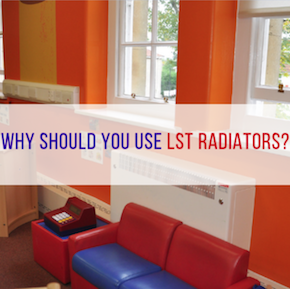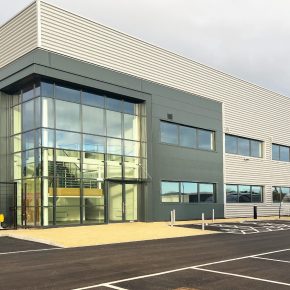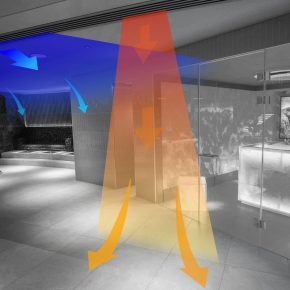
Why should you use LST radiators?
Contour discusses the importance of having LST radiators as part of your heating solution to create safer spaces for staff and service users.
In environments such as primary schools or residential care homes, there are limits on surface temperature for heating solutions. These guidelines suggest a minimum temperature and make a recommendation on how hot a radiator should get before there is an elevated risk of scalds or burns.
Installing LST radiators means using a safer heating solution that will maintain the safety of staff and service users in a space. This is particularly crucial in busy working environments where people are likely to come into contact with the LST radiator as they go about their day. This is particularly important in the healthcare and education sectors as young children and older or vulnerable people are more at risk of injuries if they come into contact with a hot surface through falls, for example.
A traditional radiator that doesn’t operate at a low surface temperature could pose as a potential safety risk for vulnerable people or children because they operate above the recommended guidelines.
Contour’s LST radiators are made with 1.5mm Zintec mild steel as standard to give a durable solution that will help the LST to stand up to the day to day challenges of busy working environments and reach their full potential lifespan.
For wet environments, particularly in the mental health sector where there may be ligature concerns, Contour recommends LST radiators that are made from magnelis. This is a form of steel that has undergone an additional treatment stage which is similar to it being hot-dip galvanised, making it more durable against rust and corrosion. LST radiators can also be supplied made from aluminium. This material is best suited to LST radiators being installed into standard environments where anti-ligature requirements aren’t a concern.
For additional durability, Contour LST radiators are supplied as one-piece constructions. This creates a more robust solution because there are no screws or bolts that make up a multi-piece unit that could come loose.
In schools and hospitals, where budgets are often stretched or tight, having an efficient heating system is vital. The NHS guidelines on hygiene in hospitals state that radiators should be cleaned at least once a week. A traditional radiator typically takes two cleaning personnel 30 minutes to clean. This includes removing the cover, cleaning the radiator and reinstalling the radiator cover.
However, Contour installs its LST radiators with RotaRad kits to give easier access for cleaning. These rotating valves allow the radiator to dropped to floor level for easier access to clean the back of the radiator and the wall behind it. Click here to read more about how to effectively clean LST radiators.
Plus, to improve heat efficiency on its LST radiators, Contour uses a layer of Kingspan foam on the inside of the radiator cover. This helps to stop any potential heat loss and reflect it back into the room, giving an overall better heat output.
Contour can be contacted at;
The Mansions
43 Broadway
Shifnal
TF11 8BB
Tel: 01952 290 498
Email: sales@contourheating.co.uk
Visit Supplier's page
Latest news

2nd April 2025
FIT Show 2025 Launches Innovative Marketplace Feature to Enhancing Value for Installers
FIT Show, the UK’s leading event for the window, door, flat glass, hardware, and roofing industries, is excited to announce the launch of a brand new Marketplace feature at its upcoming 2025 event (Birmingham NEC, 29 April – 1 May).
Posted in Architectural Ironmongery, Articles, Building Industry Events, Building Industry News, Building Products & Structures, Doors, Exhibitions and Conferences, Glass, Glazing, Hand Tools, Innovations & New Products, Plant, Equipment and Hire, Power Tools, Restoration & Refurbishment, Retrofit & Renovation, Roofs, Seminars, Training, Windows
2nd April 2025
Hi-spec deployment of EJOT Colorfast at new Birmingham logistics park
EJOT Colorfast fasteners have been used extensively in the construction of eight new high-specification warehousing and logistics buildings at the Urban 8 Logistics Park in King’s Norton, Birmingham.
Posted in Articles, Building Industry News, Building Products & Structures, Building Systems, Case Studies, Facades, Restoration & Refurbishment, Retrofit & Renovation, Roofs, Walls
2nd April 2025
SWA member delivers ‘fresh Hope’ for university’s Sustainable Building department
A detailed contract to restore an iconic Art Deco building in the heart of Birmingham’s Jewellery Quarter was carried out by Steel Window Association member, The Window Repair Company (Northwest) Limited.
Posted in Articles, Building Associations & Institutes, Building Industry News, Building Products & Structures, Building Systems, Case Studies, Glass, Glazing, Restoration & Refurbishment, Retrofit & Renovation, Steel and Structural Frames, Sustainability & Energy Efficiency, Windows
1st April 2025
Gilberts Takes Thermal Comfort to New Heights
Gilberts Blackpool is continuing to build on its reputation as a pioneer with the unveiling of ThermaAstute™ – the most extensive range of thermally sensitive diffusers in the market.
Posted in Air Conditioning, Articles, Building Industry News, Building Products & Structures, Building Services, Facility Management & Building Services, Heating, Ventilation and Air Conditioning - HVAC, Innovations & New Products, Restoration & Refurbishment, Retrofit & Renovation, Sustainability & Energy Efficiency
 Sign up:
Sign up: